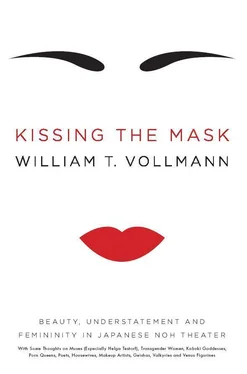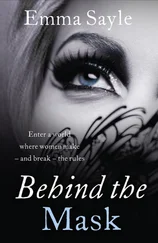I sit in a private room in the ochaya, and at last the geisha comes to me. She is so lovely I can hardly describe her. She dances for me until I begin to worry about being able to pay. I thank her; she goes; I return to Akashi. That private room, like the Noh stage, was a way station, a temporary representation of the capital.
The woman I love comes to me. She promises to be with me forever. She says that no one can see her as I do, that she sees me. Then her love departs. We leave one another. I know where she lives; I used to sleep there in her arms. No matter. I have also seen Mr. Umewaka in the mirror room behind the rainbow curtain. The far side of the painted curtain is dull. Then, from behind its dimmed down colors — I remember this from the Omi Noh Theater in Kyoto — a gap between fabric and doorway shows the crowd, the people from Akashi: the audience now waits. But that is merely what I have seen; I have failed to see the unseeable. And that woman who used to love me, I could visit her house, but would never find her there, merely her semblance; she has departed for the capital.
Clutching this transient life
I survive on the seaweed,
Which I, soaked by waves,
Gather at the isle of Irago.
What did she do for me? She showed me how beautiful heaven is. Her flesh was red and white, like the azaleas at the Shoren-in. And what did I do for her? My plainness helped her loveliness shine all the better. The Noh actor Mr. Mikata once remarked to me that for “Kinuta” a fukai mask “is almost a rule. You don’t use a ko-omote , nor a waka-onna either. That is because the servant of her husband wears a younger mask That way the audience will have an image that the husband may now love this younger woman.” I was a fukai from Akashi; she was a waka-onna from Kyoto.
Had I been sufficiently educated in courtly custom to attach a faded chrysanthemum to my poem of resentful love, thereby expressing the neglect doubly, she might have despised me less.
I go home to Akashi, where my losses live. With every step I take away from the theater, I diminish all the more into my loneliness. Even Semimaru’s palanquin-bearers are affected by this phenomenon, which resembles the falloff of sunlight according to the inverse-square law — and they know that they will be able to return home as soon as they have completed the formal abandonment of the blind prince. “I was not intended for a world in which women shackle themselves in garments that are not even made of cloth,” complains Proust, who also laments the substitution of motorcars for horse-drawn carriages. “My consolation is to think of the women whom I knew in the past, now that there is no elegance left.” This is likewise one of Noh’s consolations. The masks bring back the Heian capital, most of which perished in the Onin Wars of the mid-fifteenth century. The capital remains as still as leaf-shadows on the white panels of the Shoren-in, where each breath of camphor afternoons is cooler and more refreshing than the last. But being from Akashi, I wander through the weedy outskirts of time, interviewing men who sit in grass or plastic lean-tos, men who gaze red-eyed and yellow-eyed at their cigarette stands which hardly anyone patronizes. I have no objections to a world in which women wear garments of metal, or shoot machine-guns. ( InStyle magazine, January 2008: “Trend Watch: Metallics. No need to gloss things over this season — make them shine in rose gold, silver or copper.” Here’s a little vinyl purse, a clutch, they call it, metallically blushing at a discounted price.) I try to make the best of the fact that I was never intended for the capital, and could not expect to be welcomed there. My companions are grey water, clouds, slatey wave-shoulders, and, should I ever be so foolhardy as to seek out the capital, seasickness. ( Tales of Ise : “The sea her world, / the fisher-girl can but gather / her dreary seaweeds…”) All the same, I feel; I love; I perceive; hence I sincerely believe that my life here is or can be as fantastically lovely as the snake-necked cranes on a faded vermilion nuihaku Noh robe, each crane different, some with their triple-taloned feet open, all yellow-beaked and golden-eyed, the tops of their heads crimson like setting suns; the centers of their bodies are green-feathered in butterflylike shapes, and they wear underskirts of black feathers.
I go away, because the Noh-masked Heians have gone away. The play is over. They are the ones who were not intended for this world.
Not every personage in a Noh play departs by means of the rainbow curtain. The koken , the assistants, often leave through the tiny door at the base of the main stage, and in “The Sought-for Grave” the two tsure who play the roles of village maidens do the same. Because I am from Akashi, I cannot say whether they return to the same district of the capital as the shite . To me the capital understates itself, keeping its secrets.
The actors’ costumed reflections appear in the worn gloss of a Noh stage. Then they depart across that bridgeway, whose function and appearance remind me of what the Tale of Genji calls “the bridge of dreams,” the frail connections between man and woman, soul and world. It must be this that the shaman crosses on the Emperor’s behalf when he visits Yokihi and is regaled by her dance of everlasting pain. In his journey, he recapitulates Teika’s thirteenth-century tanka about the traveller who is crossing a bridge over a deep gorge: the autumn sunset lights of the far side of the chasm with loneliness, and his sleeves whip about in the wind.
How could she have stopped loving me? Why must Yuya’s dance come to an end? And what is it like behind the curtain? Is it a realm of more dances, ever more exquisite, like those in Dante’s Paradiso , or does it partake of the pallid severity of a Zen rock garden in Kyoto: raked gravel, tall narrow rock, long rock laid down, cloudlike rock, all enclosed in bright summer ivy? Surely there is a path behind the rainbow curtain to the mountains of Hagai, a place which contemporaries from our age gloss as “unidentified; but presumably it was a hill near Kasuga.” Long, long ago a poet’s wife died, and he wrote in the Manyoshu that he had been told she was in Hagai’s mountains. “Thither I go, / Toiling along the stony path; / But it avails me not”; he found not even her shadow. — Somewhere behind the rainbow curtain lives her shadow and more.
To any and all of these conjectural forms, Akashi remains strikingly inferior. I suppose that when Kaguyahime dons her moon robe and then gazes on her foster parents with indifference, the home they gave her disgusts her. In The Taiheiki this note is sounded so frequently that it almost becomes ludicrous. For instance, one exile’s “eldest daughter alone was suffered to remain in the capital, but eighteen daughters departed from the city weeping, to go to wearisome Tsukushi. How pitiful it was!” The narrator repeatedly applies this last ejaculation to ritual suicides and battle-deaths. Can exile really be on the same level as those? If so, how sad for us inhabitants of Akashi and Tsukushi!
How could she have stopped loving me? She saw a chance to escape from wearisome Tsukushi.
Of course she did not depart instantaneously; for a brief time I could witness her grace while she stood upon the bridge. All summer, until I pressed her at our final meeting, she would not say that she no longer loved me. After all, in both Noh and Kabuki the actor continues to perform while protractedly entering and leaving the stage-world by means of a special bridge or passageway. Zeami specifically advises that after leaving the mirror room at the commencement of a Noh performance, the actor ought to stop one-third of the way across the bridge, study the audience; and precisely when their expectations of his entrance song have reached the maximum, he should sing it. This he called “matching the feelings to the moment.”
Читать дальше












